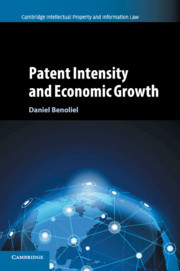Description
Patent Intensity and Economic Growth
Cambridge Intellectual Property and Information Law Series
Author: Benoliel Daniel
A theoretical critique of the patent and innovation policy funnelled by intellectual property instruments towards developing countries.
Language: English
Subject for Patent Intensity and Economic Growth:
Approximative price 40.64 €
In Print (Delivery period: 14 days).
Add to cart
Patent Intensity and Economic Growth
Publication date: 12-2018
Support: Print on demand
Publication date: 12-2018
Support: Print on demand
Approximative price 109.06 €
In Print (Delivery period: 14 days).
Add to cart
Patent Intensity and Economic Growth
Publication date: 12-2017
428 p. · 15.7x23.5 cm · Hardback
Publication date: 12-2017
428 p. · 15.7x23.5 cm · Hardback
Description
/li>Contents
/li>Biography
/li>
Economic growth has traditionally been attributed to the increase in national production arising from technological innovation. Using a panel of seventy-nine countries bridging the North-South divide, Patent Intensity and Economic Growth is an important empirical study on the uncertain relationship between patents and economic growth. It considers the impact of one-size-fits-all patent policies on developing countries and their innovation-based economic growth, including those policies originating from the World Intellectual Property Organization, the World Trade Organization and the World Health Organization, as well as initiatives derived from the TRIPS Agreement and the Washington Consensus. This book argues against patent harmonization across countries and provides an analytical framework for country group coalitioning on policy at UN level. It will appeal to scholars and students of patent law, national and international policy makers, venture capitalist investors, and research and development managers, as well as researchers in intellectual property, innovation and economic growth.
Introduction; 1. Setting the framework: patenting and economic growth policy; 2. Convergence clubs, coalitions and innovation gaps; 3. Institutions, gerd intensity and patent clusters; 4. Gerd by type, patenting and innovation; 5. Patent intensity by employment and human resources; 6. Spatial agglomeration of innovation and patents; Conclusion; Appendix; Index of persons; Index of subjects; Index.
Daniel Benoliel is a law professor at the University of Haifa Faculty of Law and Haifa Center of Law and Technology (HCLT). His main fields of expertise include international intellectual property, patent law and innovation, public international law and entrepreneurship law. Benoliel holds a Doctorate in law (J.S.D.) from University of California, Berkeley School of Law (Boalt Hall) and is a John M. Olin Research Fellow as well as a Yale Law School Information Society Project (ISP) Visiting Fellow alumnus. Benoliel has received numerous prizes, awards and research grants in these fields.
© 2024 LAVOISIER S.A.S.



